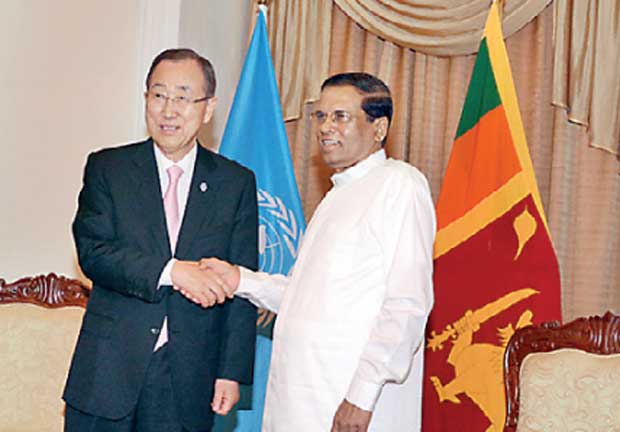Reply To:
Name - Reply Comment

 n 2009, then President Mahinda Rajapaksa had to let in thoughts begrudgingly, the UN Secretary General Ban Ki-moon on an impromptu visit here for that would serve both men
n 2009, then President Mahinda Rajapaksa had to let in thoughts begrudgingly, the UN Secretary General Ban Ki-moon on an impromptu visit here for that would serve both men
-for Mr. Ban who was facing criticism from the Human Rights lobby for the UN’s perceived failure to intervene in Sri Lanka, it was a last ditch effort to show some influence over an increasingly maverick State. For Mr. Rajapaksa who had done his job by defeating an egregious terrorist insurgency at home, it was getting the UN Chief to endorse his feat.
In hindsight, things did not turn out either way. Messrs. Ban and Rajapaksa were haunted by their perceived blotch, the latter for the remainder of his term, and the former still feeling the sting. This time around, the new government, overly accommodating in the eyes of its critics, though that may not be a fair assessment, sang a song and rolled out the red carpet for the UN Secretary General, who was also extended the liberty to travel around without hindrances.
The UN Chief, in fact reciprocated, when he hailed the steps taken towards ‘reconciliation’ by the new government. But, he threw back in our faces a good deal of goodwill extended to him, when he lumped the final phase of the Sri Lankan conflict together with Rwanda and Srebrenica.
How he reached that comparison, we don’t know, but Mr. Ban sounded like reading straightly from the TamilNet.
That was a diplomatic triumph for the pro-LTTE lobbies, many of which have now morphed into represent a multitude of earthy interests; the most pressing of all for the whole of humanity is an international war crime trial for Sri Lanka.
Delivering his speech at the Lakshman Kadirgamar Institute last week Mr. Ban said:
“Something more terrible, serious happened in the past. In 1994, in Rwanda, there was a massacre. More than one million people were massacred. United Nations felt responsible for that.”
“It happened just one year after in Srebrenica. Again, many people were massacred, when they were not fully protected by the United Nations Peacekeeping Operations. So, we repeated again, Never again.”
“How many times should we repeat never, never again? We did again in Sri Lanka. We have to do much more not to repeat such things in Sri Lanka, Yemen and elsewhere.”
Fringe –Tamil diaspora groups have campaigned and failed to classify Sri Lanka’s military offensive against terrorism as a genocide. However, substance matters little; Tamil Eelam campaign has evolved around a set of highly emotive catchphrases, selective reading of post-independent history and both real and affected sense of grievances.
Add to that a perceived claim of a genocide, or something closer to that, you will have a recipe for a set of insatiable grievances. Those grievances, if they degenerate into insist on the proverbial pound of flesh, would lead to further conflict, rather than reconciliation.
That could also kick off the beautification of a psychopathic megalomaniac, Velupillai Prabhakaran  on his journey to the heaven. Finally, those misguided display of affected guilt could well create a Vadukkodai 1976 equivalent, leading to another generation of zombie sacrifices.
on his journey to the heaven. Finally, those misguided display of affected guilt could well create a Vadukkodai 1976 equivalent, leading to another generation of zombie sacrifices.
Sri Lanka’s ethnic conflict had been escalated for nearly three decades by terrorists, who from the humble beginning of a ragtag guerrilla group, became a rebel force encompassing land, sea and air-wings, and an endless supply of suicide terrorists to boot. The essence of insurgent/ terrorist strategy is to escalate the conflict, at the same time scaling down the government’s manoeuvrability. That was what both the JVP in the South and the LTTE in the North did. A democratic government, that fights terrorism does so with one hand tied to its behind by the very laws of the country, that enshrines civil liberties and personal freedoms.

Had not the then State Defence Minister Ranjan Wijeratne decided to fight the JVP with both hands (though at a tremendous cost), our lives could well have been much more miserable in the 90s, than they really were. However, while the JVP tried to hijack the State, and with it the fate of many millions of its citizens, the LTTE only wanted to secede from the State, carrying the North and the East with it.
Thus, successive governments choose to contain the LTTE, hoping that it would help bring them to the negotiation table. That proved to be a repeated failure, and we often paid a heavier cost for our peace overtures at the resumption of every fresh round of fighting.
But, what we miscalculated was the nature of the enemy. We have been fighting a maximalist terrorist group, which have no interest in sermons of conflict resolution taken straightly from Peace Studies 101.
In the absence of a prospect of negotiated resettlement, the government could have fought a low intensity conflict (that could anyway be escalated by the terrorists over the time). We would have been living in a semi dystopian world, not sure when and where the next bomb would go off. Mr. Ban could himself keep busy, issuing media communiqués condemning every terrorist bombing and reminding us of the virtue of a peaceful settlement.
Other option was to fight a decisive battle - and finish terrorism once and for all. That would entail a heavier cost for the fire power and the ruthless determination of the terrorists. Successive governments beginning with President J.R. Jayewardene tried that, but failed, due to internal and external constraints.
Finally, the former regime of Mahinda Rajapaksa prevailed where his predecessors failed. One of the most brutal terrorist organisations was annihilated in one final decisive battle, ending a three decade long war. Mr. Ban might not have liked the end. Fringe diaspora groups did not for obvious reasons. Or Samantha Power may not like it. But, it does not matter. Millions of Sri Lankans who were victims of terrorism, who had their loved ones, property and opportunity for better living standards robbed by a three decades of war were finally happy that the war had finally ended. It may have come at a higher collateral damage, but if that was the only way to end the war, so be it, they would say.
If the ex-president forged ahead with reconciliation and addressing legitimate political grievances of Tamils, with the same efficiency seen in the war, the country, and he himself would have been spared a lot of troubles.
However, sadly though the reconciliation was delayed by the same man, who gave political leadership to defeat terrorism. That was Mr. Rajapaksa’s fault, one in a long list, beginning with his administration’s inability to take a casualty count of the final phase of the war. His self-fulfilling fallacy of “Zero human casualty” made a disclosure of the loss of civilian lives not possible. That finally gave into various concocted numbers ranging from 7,000 to 200,000.
However, now when the new administration tries to heal the old wounds, Mr. Ban and et al are trying to poke finger in our eyes. By doing so, he makes, the majority of Sinhalese who would like to go an extra mile to seek reconciliation, think twice.
He reminds the average Sinhalese folk, that their own cynical assessment of events, that all this war crime talk is a witch-hunt for defeating terrorists, could well be true. Those hypocritical cants of do-gooders would only harden the position of the ethnic majority.